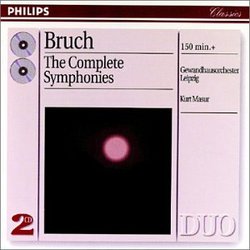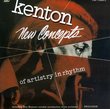| All Artists: Max Bruch, Kurt Masur, Leipzig Gewandhaus Orchestra Title: Bruch: The Complete Symphonies Members Wishing: 0 Total Copies: 0 Label: Philips Release Date: 6/9/1998 Genre: Classical Styles: Forms & Genres, Concertos, Instruments, Strings, Symphonies Number of Discs: 2 SwapaCD Credits: 2 UPC: 028946216422 |
Search - Max Bruch, Kurt Masur, Leipzig Gewandhaus Orchestra :: Bruch: The Complete Symphonies
 | Max Bruch, Kurt Masur, Leipzig Gewandhaus Orchestra Bruch: The Complete Symphonies Genre: Classical
|
Larger Image |
CD DetailsSimilarly Requested CDs
|
CD ReviewsA Pleasant Surprise Matthew C Saunders | Columbus, Ohio USA | 07/20/2000 (4 out of 5 stars) "Like most classical musicians, I knew Max Bruch primarily for his music for solo violin, and did not think of him as a symphonist. This set proves that Bruch was at home in both worlds. I wasn't sure what to expect, but I've long been addicted to the symphonic tradition -- I'll listen to anyone's symphony just to see what they'll do with the form. The Op. 28, first on the disc, struck me as being partway between Mendelssohn and Brahms (would that be Schumann?), and the style is more or less the same throughout the other two symphonies. The most striking work in this collection is "In Memoriam," Op. 68, which is clearly influenced by later ideas (or perhaps by the moodiness of Brahms' *younger* years, I can't decide which). Unlike some of the other lesser-known German romantics, Bruch the symphonist seems to have had something to say and the talent to say it. This music is unjustly neglected and Masur and the incomparable Gewandhausorchester give a fabulous reading." What if ? ......... T. Beers | Arlington, Virginia United States | 04/22/2002 (5 out of 5 stars) "Have you ever wondered what might have happened to the great Austro-German symphonic tradition if Brahms and Bruckner hadn't come along? Max Bruch provides one possible answer: a thoroughly original elaboration of the melody-based symphonic style of Mendelssohn (and, to an extent, Schumann). Bruch was a close friend of Brahms, but any influence from the latter is undetectable. Not too surprising: Bruch's first two symphonies were written well before the Brahms First appeared and are roughly contemporary with Bruckner's earliest symphonies. In any event, Bruch's symphonic style has little in common with the (in different ways) rigorously architectural styles of his two great Austro-German contemporaries. Nevertheless, Bruch's symphonies are, in their own way, superbly memorable. Bruch's melodies are distinguished, his counterpoint impeccable and his sense of orchestral color second to none. (Think of these pieces more as first-rate orchestral suites than as organically developed symphonies and you won't be far off the mark.) Most important, this music stays in your memory; none of the dull, uninspired note spinning provided by forgettable composers like Draeseke or Raff who are, every once in a while, trotted out by orchestras looking for 19th century novelties. Masur and the Gewandhaus Orchestra clearly have this music in their bones and play it to the hilt. The short works for violin and orchestra make for welcome bonuses. Recorded sound is wonderful and the price is right. Don't hesitate!" BEAUTIFUL DAVID BRYSON | Glossop Derbyshire England | 09/26/2005 (4 out of 5 stars) "It's only a slight reticence in the recorded tone that prevents me from giving the full 5 stars to this 2-disc set. In every other way it has a great deal going for it. Bruch is sadly and most unjustly neglected except for the first violin concerto, the Scottish Fantasia and Kol Nidrei in my own experience. His music is outstandingly beautiful and individual, not in my own opinion showing any undue influence from Mendelssohn much less from Schumann. To my ears these masters are no doubt part of the general romantic background that the next generation absorbed, but Bruch has a thoroughly personal style and sound of his own. If your German or French is up to it read the liner note in one of these languages rather than the English one, which is a very inferior effort from another hand. If you're stuck with English, forget Mr Fifield's gratuitous and unenlightening fixation with Mendelssohn and Schumann. Bruch's range of expression is not particularly wide, but his melodic line is stronger than Mendelssohn's, the construction of his works is more fluent than Schumann's, not to say a lot better orchestrated, and he does not sound in the least like either of them.
Bruch's three symphonies are not far behind his concertos in attractiveness, the third being perhaps the best. However one should `rate' him in some pantheon of 19th century composers, it seems to me only fair to say that they are more even in quality than those of his nearer contemporaries Tchaikovsky and Dvorak. The performances strike me as being in general excellent, with speeds well judged and the rich late-romantic idiom put over with understanding and affection. The Leipzig orchestra is not one to let us down in any way, and the solo spots must have been most gratifying to the section principals, particularly, I'd guess, to the clarinettist. The recordings of all the works comprising this set were done over the period 1977-88, except perhaps that of the A minor Romanze which for some reason we are not told. The recorded quality is not bad by any means, but I couldn't shake off the sense that the orchestral effect needs more `presence' and general lustre to it. Bruch's sound, not just in his orchestral compositions but in some chamber works that I also know and own in recordings, is highly and outstandingly beautiful and mellifluous, rich without being over-ripe. I would have liked it more `in my face', so to speak, and I found that this sense coloured my reaction to the pieces with solo violin. On another day I might have thought the solo instrument too close, but here I was glad of the impact of Accardo's intense and strong-toned playing, full of soul and heart, by way of contrast. These four shortish numbers are Bruch at his very best, and it was high time I got to know them and to have the opportunity to recommend them to anyone with ears to hear. This is a lovely pair of discs, minor reservations notwithstanding. How music of this quality has managed to stay as unfamiliar as it seems to have done is not something I can offer a good explanation for. If you don't wish it to stay unfamiliar to you, the remedy is here to hand." |

 Track Listings (8) - Disc #1
Track Listings (8) - Disc #1








